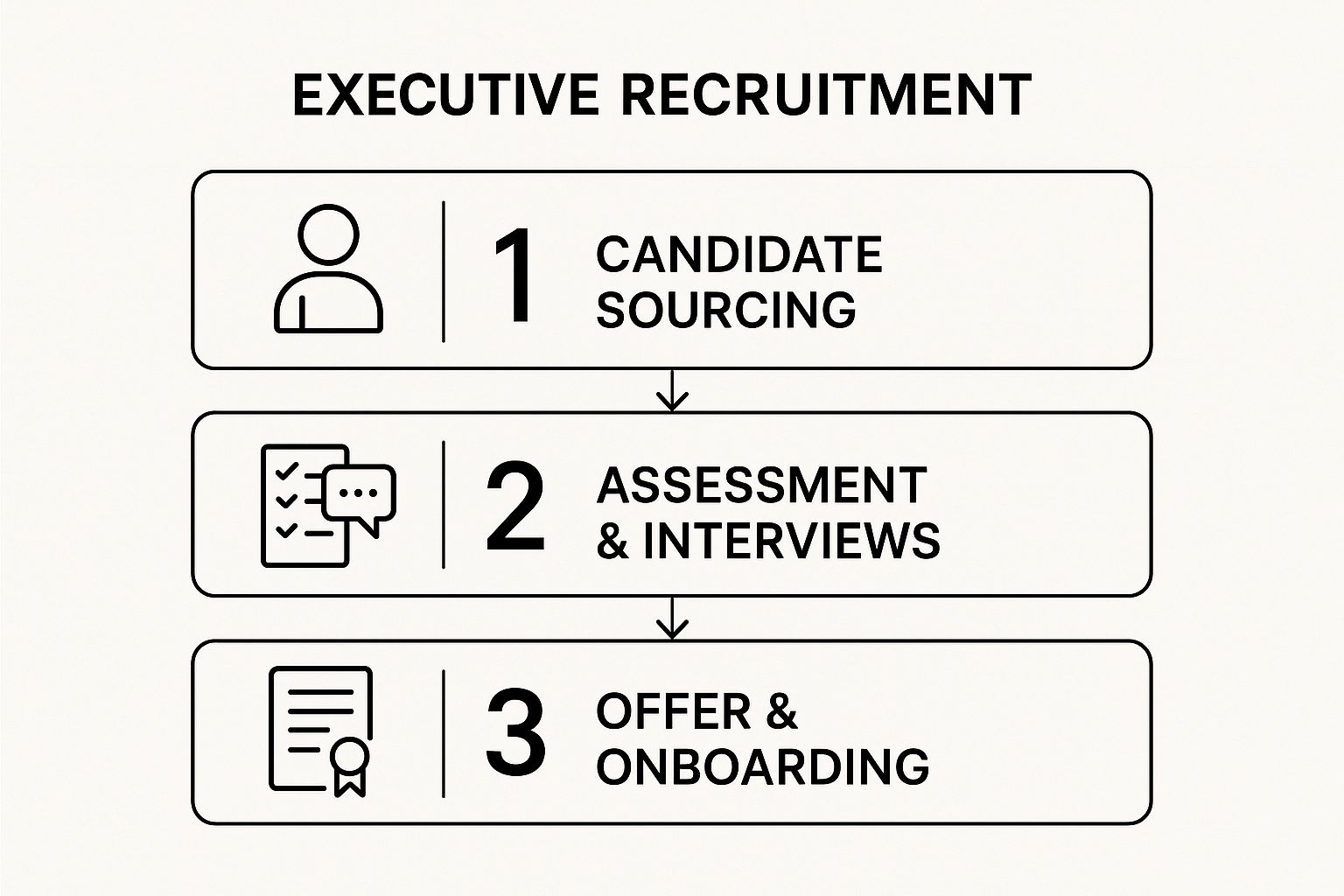What Is Executive Recruitment? Find Top UK Leaders Today
- Talent People

- Aug 2, 2025
- 13 min read
At its heart, executive recruitment is the highly specialised process of finding a company's most important leaders. It’s a world away from your everyday hiring. Think of it less like posting a job ad and more like a confidential, strategic mission to find the one person who can shape the entire future of the business. This is the process reserved for filling roles like CEO, CFO, or other C-level positions.

General Recruitment vs Executive Recruitment
To really get to grips with what executive recruitment involves, it helps to see how it stacks up against standard hiring. The goals, methods, and candidates are fundamentally different.
The following table breaks down these key distinctions:
Feature | General Recruitment | Executive Recruitment |
|---|---|---|
Candidate Pool | Primarily active job seekers who apply to public postings. | Focuses on passive candidates—successful leaders not actively looking. |
Search Method | Reactive. Posts a job and waits for applications. | Proactive. Maps the market and directly approaches ideal candidates. |
Confidentiality | Public. Roles are advertised openly. | Highly confidential. Searches are often unannounced. |
Scope | Fills a wide variety of roles across the organisation. | Fills only senior leadership and C-suite roles. |
Relationship | Transactional, focused on filling a specific vacancy quickly. | Consultative partnership, focused on long-term strategic fit. |
Expertise | Generalist knowledge of hiring processes. | Deep industry-specific knowledge and senior-level networks. |
In short, while general recruitment effectively fills the boat, executive recruitment is about finding the right captain to steer the ship.
Fishing for Talent: An Analogy
Let’s try a simple analogy. Think of general recruitment as fishing with a wide net in a well-stocked lake. You cast your net—a job advert—and wait for active job seekers to swim into it. It’s a great way to catch plenty of good fish for most roles.
Executive recruitment, on the other hand, is more like spear-fishing for a specific, prize-winning fish in the deep ocean. You don’t just cast a net and hope. You bring in an expert who knows the exact coordinates, understands the currents, and has the right bait to lure that one, perfect catch.
It's a Proactive Hunt, Not a Waiting Game
This "spear-fishing" is proactive by nature. Executive recruiters, often called ‘headhunters,’ don’t sit back and wait for applications. Their job is to map the entire market and pinpoint high-performing executives who aren’t even looking for a move. These are the most sought-after candidates because they’re already succeeding and delivering value where they are.
The real magic of executive search is its power to tap into this passive talent pool. It ensures a company isn't just hiring the best person who happened to apply, but the absolute best person for the job, full stop.
This distinction is vital because the stakes for leadership roles are astronomical. A bad C-suite hire can cost a business dearly, not just in money but in morale and strategic direction. That’s why the entire process is built on a foundation of:
Discretion: Searches are almost always confidential to prevent unsettling employees or tipping off competitors.
Deep Research: Recruiters spend a huge amount of time getting under the skin of the client’s company—its culture, its challenges, and its goals.
Strategic Outreach: Every approach to a potential candidate is handled with incredible tact and professionalism.
The UK's executive search market is projected to be worth over £2.5 billion, a figure that shows just how much top companies value finding the right leaders. This investment reflects a simple truth: the right executive can navigate any storm and unlock incredible growth. You can dive deeper into these market trends in a recent executive search update.
When Does Your Business Really Need an Executive Search Firm?

Knowing the right time to call in an executive search firm isn't about one specific moment. It’s more like recognising a set of strategic tripwires. Your usual internal recruitment process is probably fine for most roles, but some high-stakes situations just demand a specialist's touch. These are the times when a simple job advert simply won't cut it.
For example, what if you need to fill a critical leadership role with total discretion? Maybe you're quietly replacing an underperforming executive or planning a C-suite succession without causing a ripple of panic internally or tipping off your competitors. Confidentiality is everything in these moments.
The cost of getting a senior hire wrong is staggering. It can often top 200% of their annual salary once you factor in lost productivity, recruitment costs, and the damage to team morale. Bringing in a specialist firm is a powerful way to manage that risk.
This need for secrecy makes a public search a non-starter. An executive search firm acts as a trusted, confidential go-between, protecting your company's identity while they map out the market and speak to potential candidates.
Navigating High-Stakes Hiring Scenarios
Beyond keeping things under wraps, other clear signs point towards needing an executive recruitment partner. Your internal team might be brilliant at handling most hires, but they probably don’t have the specific network or global reach needed for a truly specialised leadership role.
Think about these common triggers:
You're hunting for a rare skill set: You need a CTO who’s an expert in renewable energy grid management or a Project Director with a proven track record of mobilising huge workforces in remote parts of Africa. These people aren’t scrolling through job boards. They need to be found and engaged directly.
Your team is stretched to its limit: Let’s be realistic, a senior-level search takes hundreds of hours of deep research, vetting, and careful outreach. Does your HR team honestly have that kind of time to spare?
You need an unbiased opinion: It's easy for internal biases to creep in and cloud judgement when hiring for the top jobs. An external firm brings a fresh, impartial perspective, challenging your assumptions and making sure the final choice is based on pure merit and strategic fit.
You're breaking into a new market: Expanding into a new country or industry means you don't have the local knowledge or contacts. A search firm with people on the ground can introduce you to proven leaders who know the unique cultural and business terrain inside out.
At the end of the day, you should think about bringing in a specialist when the risk of getting it wrong is just too high. If a vacant leadership role is threatening your strategic plans, holding up key projects, or putting your market share at risk, it’s time to call in the experts. Their entire process is built to find leaders who don’t just fill a seat—they drive your business forward.
Inside the Executive Recruitment Process
From the outside, the world of executive recruitment can seem a bit mysterious. It’s certainly not like standard hiring. You won't see a C-suite role advertised on a public job board; instead, the process is a much more deliberate and confidential mission to find the perfect leader.
Think of it like commissioning a bespoke piece of art. You wouldn't just wander into a gallery and pick something off the wall. You’d hire an expert who first gets inside your head to understand your vision, then meticulously seeks out the one artist capable of bringing it to life. The whole thing kicks off not with a job description, but with a deep, consultative partnership.
An executive search firm’s first job is to understand your business on a fundamental level—your culture, your market position, your strategic goals, and the precise challenges a new leader will face. This initial deep-dive shapes the entire search.
From this solid foundation, the recruiter builds a detailed "success profile". This is so much more than a list of qualifications. It’s a blueprint that outlines the ideal candidate's leadership style, their track record of specific, relevant achievements, and the personal qualities they'll need to truly thrive in your company's unique environment.
Mapping the Market and Finding Talent
With a crystal-clear picture of who they're looking for, the search firm starts the painstaking work of market mapping. This isn't just a quick search on a database. It's a comprehensive, strategic analysis of the entire industry landscape to identify every potential candidate—especially those who aren't even thinking about a new job.
These are the "passive candidates"—the successful executives who are head-down, delivering fantastic results for other companies. They are the primary targets. The firm uses its network, trusted industry sources, and deep research to build a longlist of these high-calibre individuals. The outreach that follows is handled with extreme care, introducing the opportunity in a way that respects the candidate's current role while sparking just enough interest to get a conversation started, often without even revealing your company’s name at first.
This delicate dance of sourcing and assessment is the heart of the executive search process.

This visual shows how each stage logically builds on the last, moving from a wide-angle market scan to a highly focused selection and, crucially, integration phase.
Vetting Candidates and Managing Offers
Once a candidate shows interest, they enter a rigorous vetting process. This involves multiple interview stages, and often psychometric and competency-based assessments designed to really test their skills and how they’d fit with your culture. The search partner also carries out exhaustive, confidential reference checks, speaking to former bosses and colleagues to get a 360-degree view of their performance and leadership style.
This multi-layered assessment whittles the longlist down to a final shortlist of the top three to five candidates to present to you. The firm then acts as a project manager for the interview process, gathering feedback from both you and the candidates to keep everything moving forward smoothly.
Once you’ve found your perfect match, the search firm guides the final, often tricky, stages:
Negotiating the Offer: They serve as an expert go-between, helping you put together a competitive compensation package and skilfully handling any negotiations.
Managing Resignation: They coach the candidate through resigning from their current job, helping them anticipate and manage the inevitable counter-offer.
Supporting Onboarding: A top-tier firm doesn’t just disappear after the contract is signed. They stay involved to ensure a seamless transition, setting your new leader up for success from day one.
For a more detailed breakdown of each stage, you can master the executive recruitment process with our in-depth guide to ensure your next leadership hire is a triumph.
Right, let's look beyond the simple act of filling a job vacancy. When you bring in an executive search partner, you're not just hiring a recruiter; you're investing in a strategic advantage that can genuinely shape the future of your company.
Your in-house team is likely brilliant at attracting active candidates. But what about the true game-changers? The top-tier leaders who aren't polishing their CVs or scrolling through job sites?
These are the executives already excelling in their roles, driving results for someone else. They're part of the ‘hidden’ talent market, and they’ll only consider a move if a truly exceptional opportunity is brought to them with the right blend of professionalism and discretion. Tapping into this pool is nearly impossible without the deep, trusted networks that a specialised search firm has spent years cultivating.
This single factor dramatically elevates the quality of your shortlist. Suddenly, you're not just choosing the best person who applied. You're choosing the best possible person for the role, full stop.
Gaining Strategic Market Intelligence
A huge part of what executive recruitment truly is involves gathering priceless market intelligence on your behalf. As a search partner maps the talent landscape for your specific needs, they’re effectively conducting reconnaissance on your competitors. You get an inside look at how rival companies are structured, their approach to talent, and the going rate for top leadership in your industry.
This intelligence is powerful for two key reasons:
It shapes your offer: You can craft a compensation package that isn't just a good guess, but a highly competitive and attractive proposition for the very best candidates.
It provides strategic insight: You walk away with a much clearer picture of the competitive terrain, which can inform your own business strategy long after the new hire is onboard.
This objective, third-party view gives you an unfiltered assessment of how your company is perceived in the market and what it will genuinely take to attract the calibre of leader you're aiming for.
An executive search partner does more than fill a vacancy; they provide a confidential, third-party perspective that challenges internal assumptions and ensures the hiring decision is based on objective data and strategic fit, not just familiarity.
Reducing Risk and Saving Resources
Perhaps the most compelling reason to partner with a search firm is risk management. A bad hire at the executive level is more than just an inconvenience; it can be disastrous. The fallout can easily cost a company more than double the executive's annual salary when you factor in wasted recruitment fees, lost productivity, and the ripple effect of damaged team morale.
A search firm's robust, multi-stage vetting process is built to prevent exactly that. It’s designed from the ground up to secure a candidate who is not only technically skilled but also a strong, lasting cultural and strategic fit.
On top of that, think of the time saved. A proper executive search is incredibly time-consuming. The meticulous research, the discreet outreach calls, the in-depth screening interviews, and the delicate negotiation process can swallow hundreds of hours. Handing this over to a dedicated partner frees up your own leadership and HR teams to stay focused on running the business, knowing this critical process is in expert hands. It's an investment that pays dividends in long-term stability and success.
How to Choose the Right Executive Recruitment Firm

Picking a partner for your leadership search is a high-stakes decision in its own right. Not all executive recruitment firms are created equal, and the best fit hinges entirely on your specific industry, the role's seniority, and your company culture. Get it wrong, and you’re in for a frustrating, lengthy, and ultimately fruitless search.
Think of this selection process as you would a critical hire. You’re not just buying a service; you’re starting a strategic partnership. That means you need to do your homework, starting with their genuine expertise in your field.
Evaluate Their Industry Track Record
A firm that excels in financial services probably doesn't have the network or deep-seated knowledge to find a Chief Technology Officer for a renewable energy start-up. You need a partner with a proven history of placing leaders squarely in your sector. Their consultants should speak your language, understanding the unique challenges and opportunities your industry presents.
Ask for case studies or anonymised examples of recent, relevant placements. This isn't just about them showing off; it's proof they have a live, relevant network. A solid track record also means they can offer invaluable market intelligence, giving you insights into competitor structures and what others are paying for top talent.
Choosing the right firm is about finding a true partner. Their commitment level is often revealed by their fee structure—retained search signifies a dedicated, exclusive partnership, which is standard for confidential, high-stakes leadership roles. Contingency models are more transactional and less common for executive-level appointments.
This level of insight is absolutely crucial. Recent data shows that while UK job vacancies have hit a low, the pool of available senior-level candidates has actually peaked. To navigate this tricky environment and attract the best talent when companies are cautious with spending, you need a firm with real strategic know-how.
Ask the Right Questions
Once you have a shortlist, it's time to dig deeper. Get a list of sharp questions ready that cut through the sales pitch and reveal how they actually operate.
Your aim is to understand their process, their communication style, and their commitment to finding the right long-term fit—not just filling a seat. Finding a partner whose values align with yours is a huge step toward making a successful hire and can help to reduce staff turnover in your UK business down the line.
Here are a few essential questions to put to any potential firm:
Who exactly will be leading our search, and what is their personal experience?
How do you find and approach passive candidates—the ones who aren't actively looking for a job?
What's your method for assessing cultural fit, beyond just ticking off skills and experience?
How will you represent our company and brand to the market?
Can you walk me through your process for ensuring diversity and inclusion in the search?
Their answers will paint a clear picture of their methods and tell you whether their approach genuinely lines up with your company’s goals and values.
Common Questions About Executive Recruitment
When you're thinking about bringing in an executive search firm, a few practical questions always come up. It's completely normal to wonder about the cost, how long it all takes, and how everything is kept under wraps. Let's cut through the jargon and get straight to the answers you need.
After all, this isn't just another hire. It's a major investment in your company's future, so understanding these details from the get-go is key to making it a success.
How Long Does an Executive Search Usually Take?
This is probably the number one question we get. While every search has its own rhythm, a typical executive recruitment process takes somewhere between 12 to 16 weeks. This runs from our first chat right through to your chosen candidate accepting the job offer.
It might sound like a long time, but it breaks down into clear, focused stages:
Weeks 1-4: Laying the Groundwork. This is where we really get under the skin of your business. We work with you to nail down what your ideal leader looks like and then map out the entire market to find them.
Weeks 5-8: Making Contact and Vetting. We discreetly get in touch with the people on our longlist, hold initial screening interviews, and put them through a rigorous assessment process to create a top-tier shortlist for you.
Weeks 9-16: Interviews and Sealing the Deal. You'll meet the best of the best. Once you've made your choice, we help manage the offer negotiations and support the candidate as they hand in their notice.
The pace is deliberate for a reason. It ensures we're thorough and diligent, preventing a rushed decision you might regret later.
How Is Confidentiality Maintained During the Search?
Confidentiality isn't just a feature of executive search; it's the foundation everything is built on. A leak could unsettle your team, tip off competitors about your strategy, or even put a candidate’s current job at risk. A professional firm operates with the utmost discretion.
The search firm acts as a protective buffer. They will never reveal your company’s name until a candidate is fully vetted, has shown genuine interest, and has signed a non-disclosure agreement (NDA). This protects everyone involved.
This two-way street of confidentiality is crucial. It lets you explore leadership changes without causing panic internally, and it gives top-tier candidates the confidence to explore a new role without their current boss finding out. The entire process is designed to be invisible until you’re ready to share the good news. A secure and positive process is essential, which is why it's so important to understand how to improve candidate experience with top strategies and tips.
What Is the Difference Between Retained and Contingency Search?
The way a search firm charges says a lot about the service you can expect. The two main models you'll hear about are "retained" and "contingency."
Retained Search: Think of this as the gold standard for executive roles. You pay a fee upfront to hire the firm exclusively for your search. This retainer guarantees a dedicated team and substantial resources are focused solely on your role until it’s filled. It’s a genuine partnership.
Contingency Search: With this model, the recruiter only gets paid if you hire someone they put forward. They are often working in competition with several other agencies and even your own team. It's much more common for junior or mid-level roles where that deep, dedicated approach isn't as critical.
When you're hiring for a position that will shape the future of your company, a retained search is really the only way to go. It ensures the firm is just as invested in finding the absolute best person as you are.
At Talent People, we specialise in building high-performing leadership teams for ambitious organisations in complex sectors. Our executive search solutions are designed to find the visionary leaders who will not only fit your culture but drive your business forward. Discover how our strategic approach can secure your next critical hire by visiting us at https://talentpeople.co.

Comments